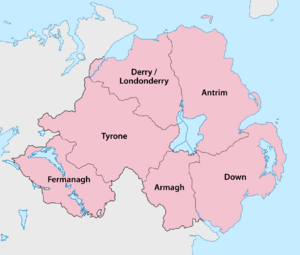Listed buildings in Northern Ireland facts for kids

Imagine a special list that helps protect old and important buildings! In Northern Ireland, some buildings are put on a list called "listed buildings." This means they are very special and need to be looked after so they don't get changed too much or knocked down. They are like treasures from the past that tell us stories about history and how people used to live.
These buildings are important parts of the United Kingdom's history, and they are protected by law. This list helps make sure that future generations can also enjoy and learn from these amazing places.
Contents
What Are Listed Buildings?
A listed building is a building that has been officially recognized as being of special architectural or historic interest. This means it's important because of its design, how old it is, or what happened there. When a building is listed, it gets extra protection. This protection helps make sure that any changes to the building are done carefully, so its special features are not lost.
There are different levels of importance for listed buildings. These levels are called "grades." The grade tells us how important a building is and how much protection it needs.
Understanding the Grades
Buildings in Northern Ireland are given different grades based on how important they are. Here's what each grade means:
- Grade A: These are the most important buildings in Northern Ireland. They are truly outstanding because of their amazing design or how well they show a certain style from the past. They are often very old and have not been changed much over time.
- Grade B+: These buildings are also very important, almost as much as Grade A. They might have a few small changes or not be quite as perfect as a Grade A building. However, they still have special features, beautiful insides, or are in a very important location. They are clearly better than most Grade B buildings.
- Grade B1 and B2: These buildings are important to their local area. They are good examples of a certain time period or style of building. It's okay if these buildings have been changed a little bit or aren't absolutely perfect in their design.
How Are Buildings Listed?
The way buildings are listed in Northern Ireland follows a special system. This system uses the traditional six counties of the province. These counties are like big areas or regions within Northern Ireland. Each county has its own list of important buildings.
This system helps keep track of all the special buildings across Northern Ireland, making sure each one gets the care and attention it deserves.
Grade A Buildings by County
Northern Ireland has many Grade A listed buildings. These are the most important ones! Here's a quick look at how many Grade A buildings each county has:
| County | Number | |
|---|---|---|
| 1 | List of Grade A listed buildings in County Antrim | 80 |
| 2 | List of Grade A listed buildings in County Armagh | 32 |
| 3 | List of Grade A listed buildings in County Down | 43 |
| 4 | List of Grade A listed buildings in County Fermanagh | 9 |
| 5 | List of Grade A listed buildings in County Londonderry | 19 |
| 6 | List of Grade A listed buildings in County Tyrone | 23 |
| TOTAL | Grade A listed buildings in Northern Ireland | 206 |
As you can see, County Antrim has the most Grade A buildings, while County Fermanagh has the fewest.
Grade B+ Buildings by County
There are even more Grade B+ listed buildings across Northern Ireland. These buildings are also very special and important, even if they aren't quite Grade A. Here's how they are spread out across the counties:
| County | Number | |
|---|---|---|
| 1 | List of Grade B+ listed buildings in County Antrim | 157 |
| 2 | List of Grade B+ listed buildings in County Armagh | 48 |
| 3 | List of Grade B+ listed buildings in County Down | 164 |
| 4 | List of Grade B+ listed buildings in County Fermanagh | 34 |
| 5 | List of Grade B+ listed buildings in County Londonderry | 65 |
| 6 | List of Grade B+ listed buildings in County Tyrone | 110 |
| TOTAL | Grade B+ listed buildings in Northern Ireland | 578 |
County Down has the most Grade B+ buildings, showing how rich its history is.

